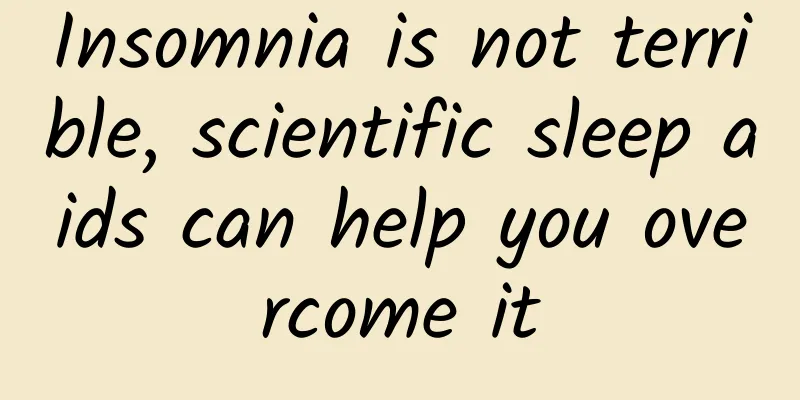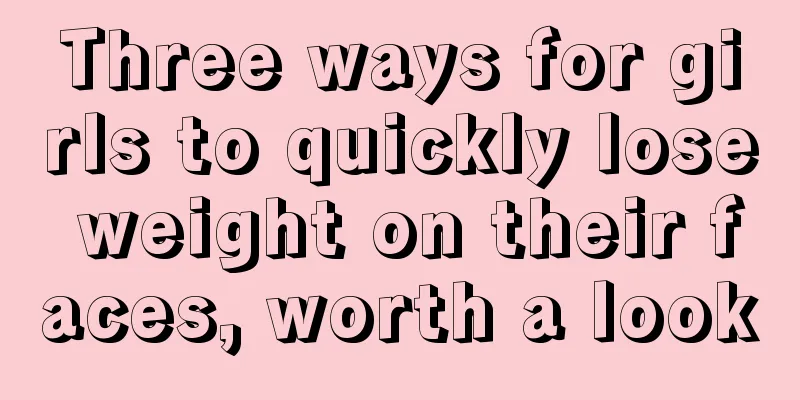Insomnia is not terrible, scientific sleep aids can help you overcome it

|
Author: Zhang Yan, deputy chief physician, Peking University Third Hospital Reviewer: Zhao Haiyan, deputy chief physician, Peking University Third Hospital Insomnia, a common sleep disorder, has attracted more and more attention. It not only affects our daily life, but also may have long-term effects on our health. If you suffer from insomnia for a long time, it is recommended to seek professional help. Professional doctors can provide targeted treatment plans based on your specific situation and help you sleep scientifically. 1. If you suffer from insomnia, you should seek medical attention immediately Insomnia is a common clinical problem. Insomnia can be manifested as taking more than 30 minutes to fall asleep under appropriate sleep opportunities and sleeping environments, awakening more than twice throughout the night, waking up earlier than usual, and feeling dissatisfied with sleep time and/or sleep quality after waking up in the morning. It can also be accompanied by daytime fatigue, low mood or irritability, physical discomfort, and cognitive impairment. It is a subjective experience. Figure 1 Copyright image, no permission to reprint From the perspective of the course of the disease, insomnia is not only characterized by persistence, but also has certain fluctuations and may be relieved naturally. For patients whose insomnia is caused by certain physical diseases, such as patients with prostatic hyperplasia who often suffer from insomnia due to frequent urination at night, or patients who have difficulty falling asleep due to itchy skin at night, they need to seek medical treatment for related diseases to improve insomnia. Elderly people often suffer from physical diseases such as hypertension, diabetes, hyperlipidemia, coronary heart disease, stroke, asthma and obstructive sleep apnea. They also often suffer from common mental disorders such as anxiety and depression. At this time, insomnia may be a clinical symptom of a physical disease or a mental disorder, or it may be an independent disease. When a patient seeks medical treatment, the attending doctor should not only analyze the patient's underlying disease, but also analyze whether insomnia is related to the acute stress event faced by the patient, or the use of drugs/substances that cause insomnia, or the patient's poor sleep habits, or changes in the sleeping environment. Figure 2 Copyright image, no permission to reprint According to the course of the disease, insomnia less than 3 months is short-term insomnia, while insomnia ≥ 3 months is chronic insomnia (long-term insomnia). Long-term insomnia will seriously affect daily work, life and memory, and will also increase the risk of various health problems. Therefore, it is recommended to seek medical attention in time after insomnia occurs, especially to prevent short-term insomnia from becoming chronic. Figure 3 Copyright image, no permission to reprint 2. Insomnia can be cured without medicine Insomnia does not necessarily require medication. There are many other treatments, including psychotherapy, physical therapy, and traditional Chinese medicine. 1. Psychotherapy Psychological treatment mainly includes sleep hygiene education and cognitive behavioral therapy for insomnia (CBT-I). (1) Sleep hygiene education: ① Avoid drinking coffee, strong tea or smoking 4 to 6 hours before bedtime; ② Do not drink alcohol before bedtime; ③ Exercise regularly every day and avoid strenuous exercise 3 to 4 hours before bedtime; ④ Do not overeat before bedtime; ⑤ Avoid doing things that are easy to excite people 1 hour before bedtime; ⑥ Keep the bedroom environment quiet and comfortable, with appropriate light and temperature; ⑦ Ensure a fixed sleep time. Patients should carry out other treatments on the basis of establishing good sleep hygiene habits. For special populations with drug contraindications or higher risks of medication, non-drug treatment is of great significance. Figure 4 Copyright image, no permission to reprint (2) CBT-I: It is the "gold standard" for non-drug treatment of insomnia and the first-line intervention measure recommended by relevant guidelines. It is also the most representative non-drug treatment method supported by evidence-based medicine to date. Commonly used treatments are as follows. A. Sleep restriction therapy: Increase the ability to fall asleep by shortening the awake time in bed to improve sleep efficiency. Specific content: ① Reduce the awake time in bed to make the bed time consistent with the actual sleep time. When the sleep efficiency is maintained above 85% for at least 1 week, the bed time can be increased by 15 to 20 minutes; ② When the sleep efficiency is lower than 80%, reduce the bed time by 15 to 20 minutes; ③ When the sleep efficiency is between 80% and 85%, keep the bed time unchanged; ④ Take a regular nap of no more than 30 minutes, avoid daytime naps, and maintain a regular wake-up time. Figure 5 Copyright image, no permission to reprint B. Stimulus control therapy: ① Go to bed when you feel sleepy; ② If you do not fall asleep after lying in bed for 20 minutes, you should get up and leave the bedroom, and return to the bedroom to sleep when you feel sleepy; ③ Do not do activities unrelated to sleep in bed, such as eating, watching mobile phones or TV, reading, listening to the radio, and thinking about complex problems; ④ Maintain a regular waking time. This therapy can re-establish a benign conditioned reflex between waking up and sleeping, and is recommended as a "standard" non-drug therapy for difficulty falling asleep and maintaining sleep. C. Relaxation therapy: It is suitable for insomnia patients who feel that they "cannot relax" and have various physical discomforts. There are three main forms, including progressive muscle relaxation/body scanning training to reduce skeletal muscle and body tension, abdominal breathing training to induce a slower and deeper abdominal breathing pattern similar to that when sleep occurs, and imagination relaxation training to adjust the body and mind to relax by self-imagination or recalling a comfortable environment or state. Relaxation therapy aims to reduce the insomniac's autonomous awakening, muscle tension and thoughts that interfere with sleep, thereby improving insomnia. Figure 6 Copyrighted images are not authorized for reproduction 2. Physical therapy Physical therapy includes repetitive transcranial magnetic stimulation, transcranial microcurrent stimulation, transcranial direct current stimulation, electrostatic therapy, EEG biofeedback, music therapy, light therapy, aromatherapy and exercise therapy. 3. Traditional Chinese Medicine Treatment The non-drug treatments for insomnia in traditional Chinese medicine include acupuncture, massage, moxibustion, cupping, acupoint application, electroacupuncture, ear acupuncture, acupoint injection and acupoint embedding, etc. Through the above non-drug treatments, insomniacs may be able to improve their condition without taking medicine, which is worth trying. Figure 7 Copyright image is not authorized for reproduction |
<<: Burns cause "legendary" diseases, not uncommon in Kawasaki
>>: Why is the blood pressure in the upper limbs different and I feel dizzy when I shake my arms?
Recommend
Why is the pregnant woman's belly tilted to the right?
Many pregnant mothers will find that their belly ...
What should I do if the white Canadian goose is dirty? Where can I wash the Canadian goose in China?
The white color of Canada Goose down jackets is g...
Anti-aging cream has no effect? Here's how to use it
Many girls use anti-aging cream to scoop out a lu...
What causes vulvar eczema? Know the cause and learn to prevent it
If vulvar eczema occurs, it means that there is a...
Treatment of simple endometrial hyperplasia
Many of our female friends may not know the cause...
How long does it take for the gynecological Qianjin capsule to take effect?
Fuke Qianjin Capsules are a common gynecological ...
Women have dull pain in the left lower abdomen and often fart
Why does a woman have dull pain in the left lower...
A woman with this temper will get breast disease at least once in her life
Recent studies have shown that unmarried and chil...
Causes of small amount of fluid accumulation in the pelvis
A small amount of fluid accumulation in the pelvi...
How long does a colposcopy take?
A colposcopy examination does not actually take a...
Foods that delay your period
When a female friend's menstrual period is ab...
Girls gym chest training equipment
Nowadays, many female friends go to the gym to ex...
How long does it take for laser stretch marks to heal?
Generally speaking, after women become pregnant, ...
Why do nipples sometimes become hard?
Women's nipples are normally soft and not eas...
What should pregnant women pay attention to?
When women are pregnant, their body's resista...









